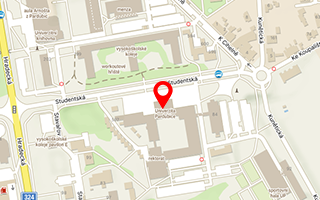Introduction in the Master Study (8 s; 2 ECTS)
The aim of this course is an introduction to environment, methodology and approaches to the organization of master study at faculty of Transport Engineering.
Coaching and Teambuilding (1 l + 2 s; 4 ECTS)
The goal of this courlp students understand basics principals of coaching and tools that can be used during coaching process. The other part is focus on cooperation in team, solving conflict situation and synergize.
Sustainable Transport (2 l + 2 s, 6 ECTS)
The course is based on characteristic features of transe is to hesport services and their relation to the sustainable development. The aim of the course is to acquaint students with the basic procedures and principles used in the planning, management and monitoring of sustainable transport and teach them to apply these procedures and principles on specific examples.
Transport, Postal Services and e-Communications Regulation (2 l + 2 s; 6 ECTS)
Logistic Technologies (2 l + 2 s; 6C)
The aim of the course is to introduce theory of logistic technologies. The students will learn how to apply this theory to logistic chains. The basic principles of modelling and simulation in logistic will be presented.
Statistical Methods (2 l + 2 s; 6 ECTS)
The main goal this course is to introduce students to the practical use of statistical methods.
Soft Computing (2 l + 2 s; 6 ECTS)
The course aim is to introduce students with the issues of Soft Computing (Computational Intelligence). The course is focused on acquiring knowledge, mastering algorithms, mastering tools and developing skills in the design and implementation of systems based on computational intelligence methods so that they can work with uncertainty in data for more effective management and decision-making.
Logistic Management (2 l + 1 s; 6 ECTS)
The aim of the course is to acquaint students with logistic management and see this issue in a broader context and in the context of the EU and globally. In this course, students will build on previous knowledge of logistics and extend their knowledge of supply chain management, familiarize themselves with the structure, meaning and purpose of logistics chains and global logistics in general. They will also learn about concrete solutions used in practice in case studies.
Marketing Management in Transport (2 l + 2 s; 6 ECTS)
The aim of the course is to acquaint students with the theoretical basis and specifics of marketing of transport services, including the ability of their practical application to the extent required to build marketing-oriented companies. The course is based on the characteristics of transport services and their implications for marketing management and planning in companies providing these services. Students will be acquainted with the basics of transport services marketing, strategic marketing management and planning, marketing analysis tools, marketing tools applied in the transport services market, customer purchasing behavior, competition, use of brand management in transport services, marketing information systems and global service marketing.
Optimization in Transport (13 l +39 s; 6 ECTS)
The target of the study subject is to inform students about selected optimization problems in transport and its theoretical background. Students will be lectured how to formulate an adequate mathematical model for these problems and then how to apply this model for solution of task. Basics of transport modelling are incorporated as well.
Software Support for Transport (1 l + 2 s; 6 ECTS)
The aim of this course is to introduce the software for planning of parking places (CAD), for creation of timetables in public transport and geographic information systems (ArcGIS).
Master Thesis Seminar (26 l; 4 ECTS)
The aim of the course is to provide students with basic information concerning writing and layout of the master thesis and its defense.
Business Intelligence (2 l + 2 s; 6 ECTS)
The course aims are to introduce students with issues of Business Intelligence (BI). The course is focused on gaining knowledge, mastering procedures, mastering tools and developing skills in analysis, evaluation and reporting of data for the needs of effective work with company data, faster and more effective decision-making.
Analysis and Optimization of Transport Systems (1 l + 3 s; 6 ECTS)
The target of the study subject is to inform students about basics of general system theory as well as about selected possibilities of optimization of transport systems. Selected topics of decision-making, scheduling, information theory and capacity assessment in relation to transport are taking part of the subject.
Passenger Transport (2 l + 1 s; 6 ECTS)
Progressive Systems of Intermodal Transport (2 l +2 s; 6 ECTS)
The aim of the course is to introduce new combined transport systems used in the Czech Republic and Europe and in the World, new transloading technologies and container transport innovations.
Master Thesis (22 ECTS)
The course is focused on independent work of the student under the guidance of the supervisor. The aim of the course is to manage students to proper elaboration and defense of the master thesis. The content of the course are individual consultations with the master thesis supervisor. The student presents particular parts of the thesis continuously to the supervisor and incorporates his/her comments. Student consults the concept and the structure of the thesis, used methods, cited professional literature, etc. Documents and instructions concerning the master thesis formal elaboration, its submission and defense as well as information about organization of state final examinations will be published
Project Management (2 l + 2 s; 5 ECTS)
The course objective is to make students acquainted with project management in all phases of project life cycle, modern tools of project management and activities and procedures of project planning and project realization.through the IS STAG.
Pricing in Transport (2 l + 2 s; 5 ECTS)
The aim of the course is to acquaint students with the basic procedures used in price and tariffs creation in transport, as well as with the distribution of tariffs and prices and their use in various modes of transport. Part of the course is also legislation in the field of tariffs and prices from the perspective of the EU.

